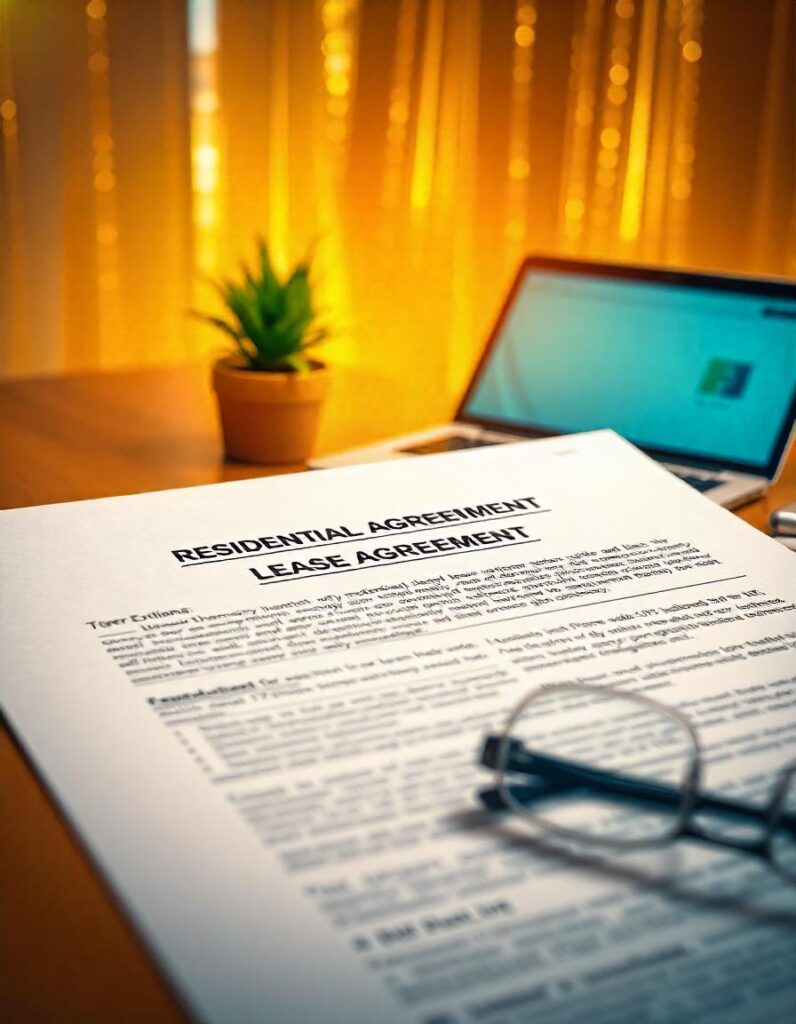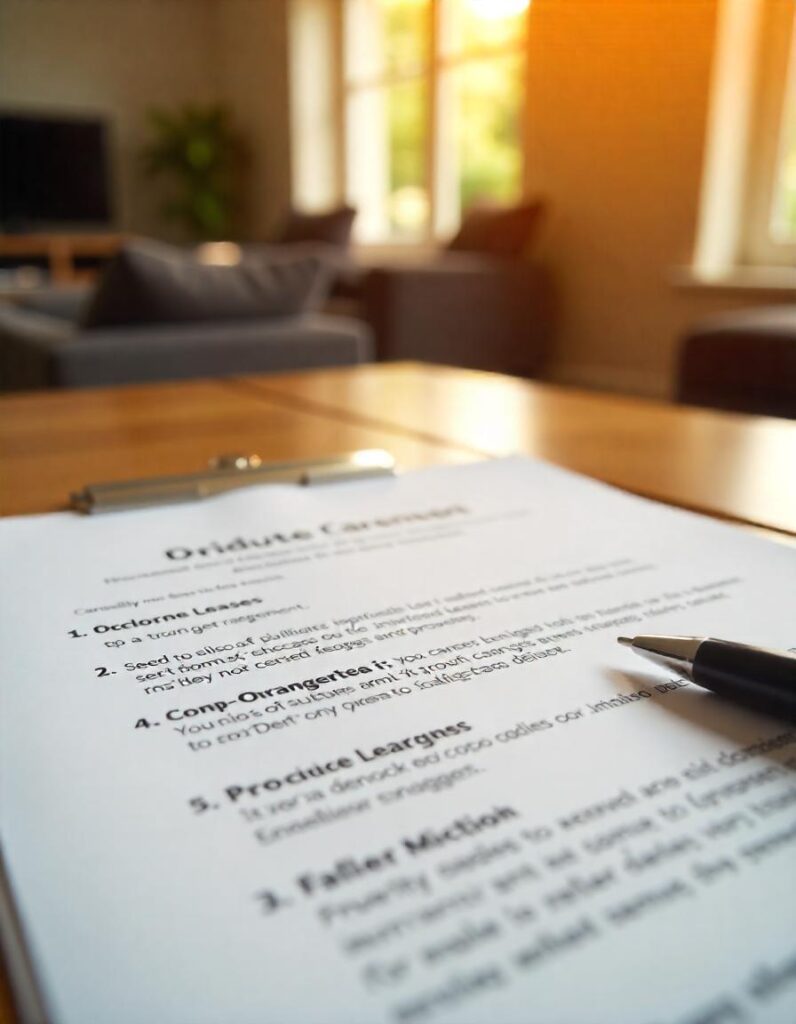A residential lease agreement is a legally binding document that outlines the relationship between a landlord and a tenant. It is essential for both parties to understand its terms thoroughly to avoid disputes and ensure a smooth tenancy experience. This article highlights the critical aspects you should know about a residential lease agreement.
What is a Residential Lease Agreement?
A residential lease agreement is a contract that allows a tenant to use a property owned by the landlord in exchange for rent. It specifies the rights, responsibilities, and obligations of both parties. This agreement is crucial for protecting the interests of landlords and tenants while clearly defining the terms of the tenancy.

Important Components of a Lease Agreement
A standard lease agreement typically includes the following elements:
- Names of Parties: The agreement must identify the landlord and tenant.
- Property Description: Details such as the address, apartment number, and features of the property.
- Lease Term: Specifies whether it’s a fixed-term or month-to-month agreement.
- Rent Amount and Payment Terms: The rent amount, due date, and acceptable payment methods.
- Security Deposit: The amount required upfront and conditions for its refund.
- Maintenance Responsibilities: Clear guidelines on who is responsible for repairs and upkeep.
- Rules and Restrictions: Any rules about pets, subleasing, or property modifications.
The Role of Security Deposits
A security deposit is an essential component of most lease agreements. This amount protects the landlord in case of damages beyond normal wear and tear or unpaid rent. Tenants should ensure the deposit terms are fair and clearly stated, including conditions for deductions and refund timelines.
Common Lease Terms to Negotiate
Before signing a lease, tenants should review the terms carefully and negotiate if needed. Common areas for negotiation include:
- Rent Increase Clauses: Ensure there are reasonable limits on how often and by how much the rent can be raised.
- Renewal Terms: Understand whether the lease renews automatically or requires action.
- Utilities: Clarify which utilities are included and who is responsible for paying them.
Legal Rights and Responsibilities
Both landlords and tenants have specific legal rights and responsibilities. Landlords must provide a safe and habitable living environment, while tenants must pay rent on time and adhere to the lease terms. Violating these responsibilities can lead to disputes or legal action.

Benefits of a Written Agreement
A written lease agreement offers clarity and legal protection. It serves as evidence in case of disagreements and ensures that both parties are aware of their obligations. Verbal agreements are more prone to misunderstandings and lack enforceability in many jurisdictions.
Tips Before Signing a Lease Agreement
- Read the Entire Document: Never sign a lease without thoroughly reading it.
- Ask Questions: Clarify any vague or confusing terms.
- Inspect the Property: Document any pre-existing damage to avoid disputes later.
- Get Everything in Writing: Ensure all verbal promises are included in the lease.
Common Mistakes to Avoid in Lease Agreements
Many tenants and landlords make mistakes such as skipping the fine print, overlooking renewal terms, or failing to document agreements in writing. Understanding these pitfalls can help both parties avoid costly errors.
Importance of State and Local Laws
Each state or region has specific landlord-tenant laws governing security deposits, eviction processes, and rent control. Familiarizing yourself with these laws ensures compliance and protects your rights.
How to Amend a Lease Agreement
Changes may be necessary during the lease term, such as adding a roommate or adjusting payment terms. Learn how to amend a lease legally to ensure the updates are enforceable.
Ending the Lease: What You Should Know
When the lease term ends, both parties must follow certain protocols, such as giving proper notice, conducting move-out inspections, and handling security deposit refunds. Understanding the process ensures a smooth transition.

Understanding the Lease Term: Fixed vs. Month-to-Month
This section explains the differences between fixed-term and month-to-month leases, helping tenants and landlords choose the best option based on their needs and preferences.
Consequences of Violating Lease Agreement Terms
Learn about the potential legal and financial consequences for both landlords and tenants if the terms of the lease agreement are violated, including eviction, fines, and damage claims.
How to Negotiate Terms in a Lease Agreement
This section discusses strategies for tenants and landlords to effectively negotiate lease terms such as rent, deposit amount, and maintenance responsibilities.
Rent Payment Terms: Understanding Your Obligations
Explore the different rent payment structures, due dates, late fees, and acceptable payment methods that are commonly included in residential lease agreements.
What to Do if You Need to Break Your Lease Early
Learn the steps tenants should take if they need to break a lease early, including understanding the penalties, potential exceptions, and legal options available.

FAQs
1. What is a residential lease agreement?
A residential lease agreement is a legal contract between a landlord and a tenant that outlines the terms and conditions under which the tenant rents the property. It details rent, duration, responsibilities, and other important rules.
2. What should be included in a residential lease agreement?
Key elements include the names of the landlord and tenant, property description, lease term, rent amount, payment due dates, security deposit, and any rules or restrictions related to the property.
3. What is a security deposit, and how does it work?
A security deposit is an amount of money paid upfront by the tenant to cover any potential damage to the property or unpaid rent. The landlord must return it at the end of the lease, minus any necessary deductions, within a certain time frame.
4. Can a lease agreement be modified once signed?
Yes, a lease agreement can be amended, but both the landlord and tenant must agree to the changes. Any amendments should be documented in writing and signed by both parties to remain enforceable.
5. What happens if a tenant breaks the lease early?
Breaking a lease early can result in financial penalties, including losing the security deposit or having to pay rent for the remaining term of the lease. Specific penalties depend on the lease terms and local laws.
6. How can a tenant protect themselves in a lease agreement?
Tenants should carefully read the agreement, negotiate unclear or unfair terms, ensure everything discussed is in writing, and document any pre-existing damage in the property before moving in.
7. What happens if the landlord doesn’t maintain the property?
If the landlord fails to maintain the property in a habitable condition, tenants may have legal grounds to withhold rent, demand repairs, or even terminate the lease, depending on local laws.
8. Can a landlord enter the property without the tenant’s consent?
In most cases, a landlord must give advance notice before entering the property, except in emergency situations. The notice period typically ranges from 24 to 48 hours, depending on local laws.
9. Can a lease agreement automatically renew?
Some lease agreements contain an automatic renewal clause, meaning the lease renews for another term unless the tenant or landlord gives notice of termination. Tenants should check if this clause is included and understand the renewal terms.
10. What should a tenant do if they can’t pay rent on time?
If a tenant is unable to pay rent on time, they should communicate with the landlord as early as possible. Some landlords may allow for a grace period or work out a payment plan. It’s important to keep a written record of any agreements made.
Conclusion
A residential lease agreement is a vital document for tenants and landlords alike. Understanding its terms, negotiating fair conditions, and adhering to the agreement can prevent conflicts and create a positive rental experience. Always consult a legal professional if you are unsure about any part of the lease.









